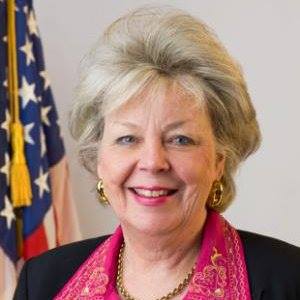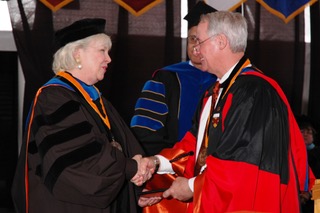Awarded for her work in Uzbekistan, “maintaining educational cultural ties and staff morale in an openly hostile climate.”
Awardee Database
Awardees
Victoria Sloan
In recognition of her work in Kazakhstan, with “significant contributions to educational and cultural diplomacy while leading and mentoring American and national colleagues.”
Jean Manes
In recognition of her work in Montevideo. Manes also participated in a broadcast on the Lois Roth Award on the Voice of America Spanish.
Orna Blum
Orna Blum was award Lois Roth Award (Honorable Mention) for work with marginalized communities in Jamaica.
Omie Kerr
Exceptional second prize awarded for work as a Cultural Attaché in Mexico.
Sandra Kaiser
In recognition of her work as a gifted Public Affairs Officer in Athens.
Marjorie Ransom
In recognition of the contributions as a Foreign Service Officer of one of the Award’s original designers, who first met Lois in 1967 in Tehran.
Georgia Hubert
In recognition of her excellence in carrying out the merging of the US Information Service into the State Department her USIA-State merger and training State officers to take over the simple grant-making activities formerly carried out by USIA.
Mary Lou Edmondson
In recognition of her work as a mainstay in the New York press center of the US Information Agency
Adrienne O’Neal
In recognition of her service in Rio de Janiero.
Arlene Jaquette
In recognition of her work as a Public Affairs Officer in Addis Ababa
Mary Carlin Yates
The award citation reads: For outstanding creativity, initiative and sensitivity in directing and managing USIS programs in Zaire from 1993 to 1995. Her achievement in reaching out to newly-formed political groups and the Zairian intellectual community restored the U.S. as a leading force for justice and will form the basis of American-Zairian relations in coming decades. Her dynamism, sensitivity and integrity fully reflect the legacy of Lois Roth.
In her letter of thanks she wrote, “Every year, when I read the criteria for the Lois Award, I recommit myself to trying to live up to her high standard.” Mary Carlin Yates went on to be come U.S. Ambassador to the Republic of Burundi from 1999 until June 2002, and as U.S. Ambassador to the Republic of Ghana from November 2002 to 2005.

This first of twelve portraits in 2017, honoring alumni from thirty years of Roth Foundation programs, features The Honorable Mary Carlin Yates.
Mary won the Lois Roth Award in 1997 for her performance as a Cultural Affairs Officer in Kinshasa from 1993 to 1995. During her years in Zaire, Mary established relationships with new political groups and the Zairian intellectual community with creativity and ingenuity. Her work not only assisted the US in regaining its former status as a force for justice and the promotion of democracy in the region, but also made a lasting impact on the nature of American-Congolese relations. Mary explained that, because she could not travel to DC to receive her award in person, her sister and niece represented her at the ceremony, and the event was such an inspiration that her niece went on to join the Foreign Service herself.
Mary was particularly honored to receive the Lois Roth Award, not only for the values the award promotes, but also because Lois Roth was one of her own mentors. In thanking us at the time, Mary wrote: “Every year, when I read the criteria for the Lois Roth Award, I recommit myself to trying to live up to her high standard.” These many years later, Mary explained: “Lois Roth and [my second mentor] Ambassador Melissa Wells taught me that I could be anything I wanted, and even aspire to be an Ambassador. Thanks to role models like these, I never let being a woman cross my mind in any job I went for, whether in the State Department or on interagency assignments to the Department of Defense and National Security Council.” Mary, in turn, has been a strong role model for many women in the Foreign Service.

Mary considers cultural diplomacy to be “the most important tool in the foreign policy toolbox.” For her, the engaged conversations inspired by cultural and educational programing are the most effective vehicle for communicating the values of the U.S. to the peoples of other countries. The value of this approach has been made clear by her experiences abroad. Although she started her work in Zaire as a political officer, she later switched to Public Diplomacy where she realized she had a greater impact through cultural and educational programs and that even the smallest Public Diplomacy program, —such as helping women to create an AIDS education NGO, or providing election-watch training—could have a lasting, positive impact.
Mary has made significant contributions to American cultural diplomacy. In 1999, a mere two years after receiving her Lois Roth Award, she became the US Ambassador to the Republic of Burundi; there she contributed to efforts led by Nelson Mandela to promote peace between members of the Hutu and Tutsi ethnic groups. In 2002, she became the US Ambassador to Ghana, where she advocated for peace between opposing factions in neighboring Liberia and influenced numerous governmental policies. From 2005 to 2012, she served in a variety of key positions, first as a foreign policy advisor for the US-European Command, then as a deputy to the commander for civil-military activities in the US-Africa Command, and finally as a senior director for African affairs in President Obama’s National Security Council. After additional service as Charge in Khartoum, Sudan, Mary retired from the diplomatic corps in 2012, but she remains busy and passionate about promoting cross-cultural understanding.
Recently, Mary has been reflecting on the importance of giving back to organizations that promote the values she supports. She said, “It was when I was called to become more involved with my alma mater, Oregon State University by serving on the Board of Regents of the Honors College and as a Trustee of the OSU Foundation, that I understood the true meaning of ‘legacy’ and how even a modest amount of effort and financial contributions make a big difference to preserving a legacy you believe in and that you want to see maintained. I realized I should give back to the institutions that reflect my beliefs and shaped my career. I want to urge everyone who really believes in what Lois did and stood for to support the Endowment so that its awards can continue to encourage and inspire others. In an era where women’s rights may be taking a step backwards, it is all the more important to support the legacy of people like Lois Roth.”
——————————-
This alumni portrait was written by Drew Barnhart, the Roth Foundation’s Social Media and Outreach Manager, based on an interview conducted by retired Foreign Service officer and Roth Foundation Board member Anne Barbaro.

Nan Bell
The first winner of the Lois Roth Award, Nan Bell was nominated by her entire staff at the European Branch of the International Visitor program for her work during a period of explosive growth in programs following the fall of the Berlin wall.
Harriet Elam
In recognition of her work while Cultural Attache in Athens (1983-1987) and for her mentorship of younger officers.
*The Prix Coindreau Prize, The Jeanne Varnay Pleasants Prize for Language Teaching, and the CASVA-Henry & Judith Millon Award are currently inactive.
